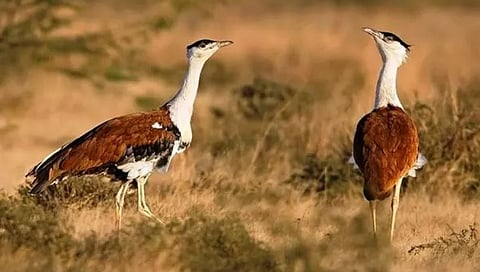
- Home
- Live Blog
- Breaking News
- Top Headlines
- Cities
- NE News
- Sentinel Media
- Sports
- Education
- Jobs

Jaipur: Known for following the overseas research and having not fared brilliantly so far in its wildlife conservation centric research, India enters 2020 with a successful world record - having succeeded in breeding of Great Indian Bustard (Ardeotis nigriceps), whose global population had plummeted to 150, according to officials and they were less than 75 as per the private sector experts.
Nine eggs were collected from the wilderness in the Desert National Park in Jaisalmer district of Rajasthan in India during the summer of 2019. They were artificially incubated and chicks were hand-reared at a work station near Sam in the vast stretch of habitat, which had faced increasing threats from poaching, predators (feral dogs, fox, eagles, hawks, snakes, etc), power lines, and above all lack of appropriate priority at government level, both in Jaipur and New Delhi.
All nine chicks are doing well. Interestingly, seven are females, one male and the sex of the ninth is yet to be ascertained. So it has provided us with the “foundation captive stock” which can enable experts to breed the birds ex situ, and save the species from extinction, so to say. The IUCN (International Union for Conservation of Nature and Natural Resources) had categorized the species as critically endangered. Grave concerns were voiced by experts all over the world over delay in conservation for decades.
It is a ten-year-long project piloted by Rajasthan’s Forest Department, led by Arindam Tomar, Chief Wildlife Warden. He issued permissions in a fast track and scientific manner soon after taking over in January 2019. The Wildlife Institute of India, based at Dehradun, was invited as the Ministry of Environment Forest and Climate Change (MoEFCC) sanctioned funds to go ahead with the challenging project. None of them had previous experience to breed such a species.
Abu Dhabi based National Avian Research Centre, initiated by some progressive Arab Sheikhs, was roped in to help. It has proven track record in breeding Houbara, a cousin of Great Indian Bustard, which is bred in thousands almost every month and released in the wild. The objective is to re-stock the Houbara bustard population which had declined. The Sheikhs are noted for love of falconry and Houbara is their favorite quarry.
One of the reasons for the decline in the bustard population is attributed to the sport Arab Sheikhs used to indulge in 1978-79. The Sheikhs came to do falconry in Jaisalmer district as guests of the central government. Harsh Vardhan, Jaipur based conservationist, found it to be a violation of the Wildlife Protection Act and mobilized demonstrations against what he called a wanton act. The Rajasthan High Court at Jodhpur issued a stay order against this sport on January 2, 1979, which caused the royal guest to abandon safari midway. (IANS)